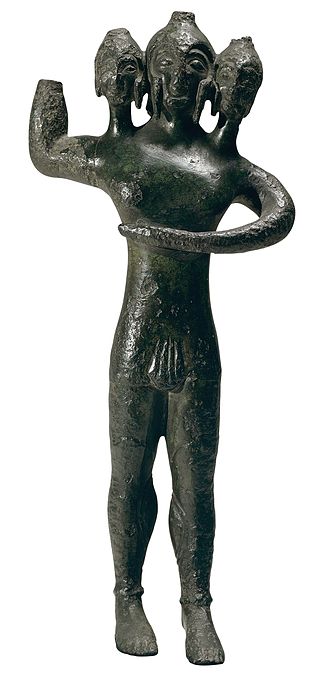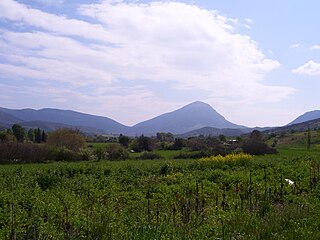Other
- Hippolytus and Aricia by Jean-Philippe Rameau
- Hippolytus a Greek non profit organisation for the preservation and cultural promotion of the Skyros Pony.
- Hippolytus, a misspelling used for Hippolyte (crustacean), a genus of shrimp
Hippolytus may refer to:
An antipope is a person who makes a significant and substantial attempt to occupy the position of Bishop of Rome and leader of the Catholic Church in opposition to the legitimately elected pope. At times between the 3rd and mid-15th centuries, antipopes were supported by important factions within the Church itself and by secular rulers.

Theseus was the mythical king and founder-hero of Athens. The myths surrounding Theseus – his journeys, exploits, and friends – have provided material for fiction throughout the ages.

Jean-Baptiste Racine was a French dramatist, one of the three great playwrights of 17th-century France, along with Molière and Corneille as well as an important literary figure in the Western tradition and world literature. Racine was primarily a tragedian, producing such "examples of neoclassical perfection" as Phèdre, Andromaque, and Athalie. He did write one comedy, Les Plaideurs, and a muted tragedy, Esther for the young.

Tragedy is a genre of drama based on human suffering and, mainly, the terrible or sorrowful events that befall a main character. Traditionally, the intention of tragedy is to invoke an accompanying catharsis, or a "pain [that] awakens pleasure", for the audience. While many cultures have developed forms that provoke this paradoxical response, the term tragedy often refers to a specific tradition of drama that has played a unique and important role historically in the self-definition of Western civilization. That tradition has been multiple and discontinuous, yet the term has often been used to invoke a powerful effect of cultural identity and historical continuity—"the Greeks and the Elizabethans, in one cultural form; Hellenes and Christians, in a common activity," as Raymond Williams puts it.

Hippolytus of Rome was one of the most important second-third century Christian theologians, whose provenance, identity and corpus remain elusive to scholars and historians. Suggested communities include Rome, Palestine, Egypt, Anatolia and other regions of the Middle East. The best historians of literature in the ancient church, including Eusebius of Caesarea and Jerome, openly confess they cannot name where Hippolytus the biblical commentator and theologian served in leadership. They had read his works but did not possess evidence of his community. Photios I of Constantinople describes him in his Bibliotheca as a disciple of Irenaeus, who was said to be a disciple of Polycarp, and from the context of this passage it is supposed that he suggested that Hippolytus so styled himself. This assertion is doubtful. One older theory asserts he came into conflict with the popes of his time and seems to have headed a schismatic group as a rival to the bishop of Rome, thus becoming an antipope. In this view, he opposed the Roman Popes who softened the penitential system to accommodate the large number of new pagan converts. However, he was reconciled to the Church before he died as a martyr.

In Classical Greek mythology, Hippolyta, or Hippolyte was a daughter of Ares and Otrera, queen of the Amazons, and a sister of Antiope and Melanippe. She wore her father Ares' zoster, the Greek word found in the Iliad and elsewhere meaning "war belt." Some traditional English translations have preferred the more feminine-sounding "girdle." Hippolyta figures prominently in the myths of both Heracles and Theseus. The myths about her are varied enough that they may therefore be about several different women.

In Greek mythology, Geryon, son of Chrysaor and Callirrhoe, the grandson of Medusa and the nephew of Pegasus, was a fearsome giant who dwelt on the island Erytheia of the mythic Hesperides in the far west of the Mediterranean. A more literal-minded later generation of Greeks associated the region with Tartessos in southern Iberia. Geryon was often described as a monster with either three bodies and three heads, or three heads and one body, or three bodies and one head. He is commonly accepted as being mostly humanoid, with some distinguishing features and in mythology, famed for his cattle.

In Greek mythology, Phaedra was a Cretan princess. Her name derives from the Greek word φαιδρός, which means "bright". According to legend, she was the daughter of Minos and Pasiphaë, and the wife of Theseus. Phaedra fell in love with her stepson Hippolytus. After he rejected her advances, she accused him of trying to rape her, causing Theseus to pray to Poseidon to kill him, and then killed herself.

In Greek mythology, the Cretan Bull was the bull Pasiphaë fell in love with, giving birth to the Minotaur.

Hippolytus is an Ancient Greek tragedy by Euripides, based on the myth of Hippolytus, son of Theseus. The play was first produced for the City Dionysia of Athens in 428 BC and won first prize as part of a trilogy.

In Greek mythology, Hippolytus is the son of Theseus and either Hippolyta or Antiope. His downfall at the hands of Aphrodite is most famously recounted by the playwright Euripides, although other, sometimes differing versions of the story have also survived.
Sophrosyne is an ancient Greek concept of an ideal of excellence of character and soundness of mind, which when combined in one well-balanced individual leads to other qualities, such as temperance, moderation, prudence, purity, decorum, and self-control. An adjectival form is "sophron."

Phèdre is a French dramatic tragedy in five acts written in alexandrine verse by Jean Racine, first performed in 1677 at the theatre of the Hôtel de Bourgogne in Paris.
Aricia can refer to:

Troezen is a small town and a former municipality in the northeastern Peloponnese, Greece, on the Argolid Peninsula. Since the 2011 local government reform it is part of the municipality Troizinia-Methana, of which it is a municipal unit. It is part of the Islands regional unit.
Phaedra may refer to:

The Elcesaites, Elkasaites, Elkesaites or Elchasaites were an ancient Jewish Christian sect in Lower Mesopotamia, then the province of Asoristan in the Sasanian Empire that was active between 100 and 400 CE. The members of this sect, which originated in the Transjordan, performed frequent baptisms for purification and had a Gnostic orientation.

Phaedra is a Roman tragedy written by philosopher and dramatist Lucius Annaeus Seneca before 54 A.D. Its 1,280 lines of verse tell the story of Phaedra, wife of King Theseus of Athens and her consuming lust for her stepson Hippolytus. Based on Greek mythology and the tragedy Hippolytus by Euripides, Seneca's Phaedra is one of several artistic explorations of this tragic story. Seneca portrays Phaedra as self-aware and direct in the pursuit of her stepson, while in other treatments of the myth, she is more of a passive victim of fate. This Phaedra takes on the scheming nature and the cynicism often assigned to the nurse character.
Hippolyte, tragédie tournée de Sénèque is a French translation of the Latin play of Seneca, called Phaedra. Its Belgian translator, Jean Yeuwain, takes some liberties with the original. It was first published in 1591.
Hippolyte or Hippolyta was the Amazonian queen with a magic girdle, in Greek mythology, and there are other mythological figures named Hippolyte. The name of the amazon, Ἱππολύτη, translates to 'having loosened horses'. The name of her son, Ἱππόλυτος, is taken to be ironically ambiguous, also translating to 'being destroyed by horses', as he dies when his out-of-control chariot horses throw him off.